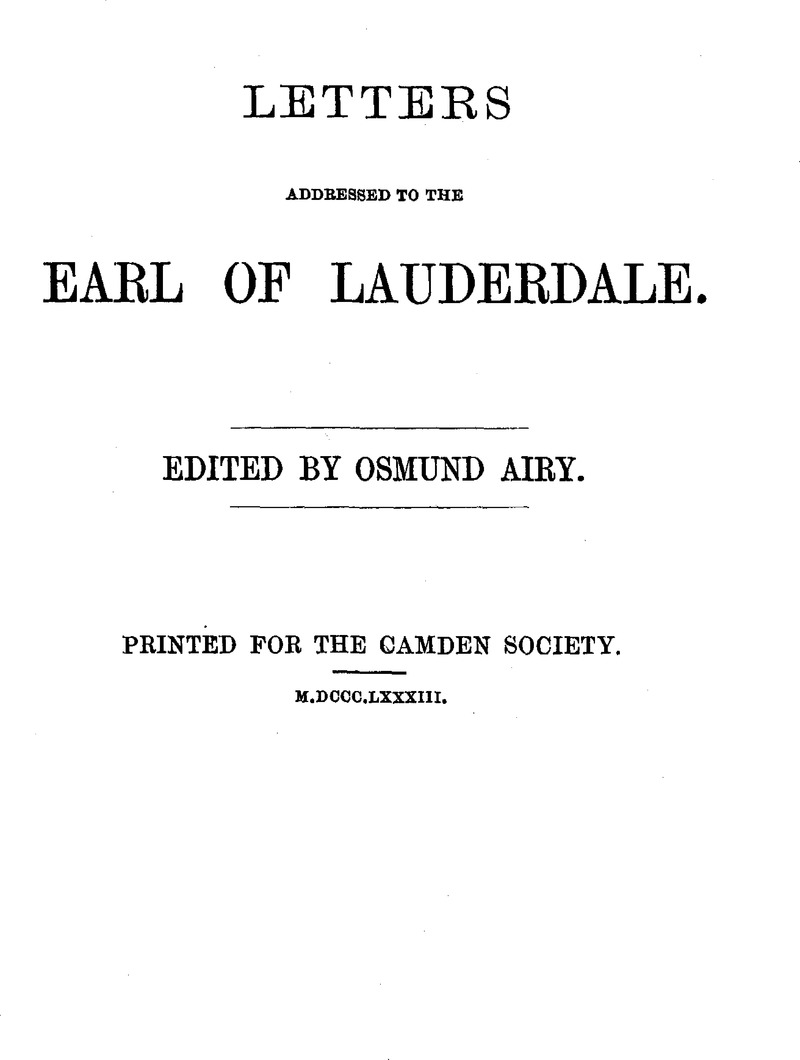No CrossRef data available.
Article contents
Letters addressed to the Earl of Lauderdale
Published online by Cambridge University Press: 24 December 2009
Abstract

- Type
- Other
- Information
- Camden New Series , Volume 31: The Camden Miscellany, Volume the Eighth. , December 1883 , pp. 1 - 44
- Copyright
- Copyright © Royal Historical Society 1883
References
page 2 note a The project mentioned in this and succeeding letters is probably the confirmation of the Presbyterian government, which Lauderdale urged upon Charles as being the best way to secure Scotland in his interest in case of complications with his English subjects. Burnet mentions a long letter written to Cassilis' daughter, Margaret Kennedy, by Lauderdale on this subject. See, on the whole matter, Burnet, vol. iGoogle Scholar. sect. 108.
page 2 note b Italian “incatenare,” to bind.
page 2 note c The oath of allegiance which acknowledged the King's supremacy in ecclesiastical matters. See Mackenzie, 's Memoirs, p. 23.Google Scholar
He was declared incapable of trust on April 10, after a second refusal, when summoned as an extraordinary lord of session. See 23116, ff. 17, 19.
page 3 note a Stirling.
page 5 note a Cassilis was nominated a member of the Scotch Privy Council, 1661, Feb. 13.
page 6 note a Sec following letter.
page 6 note b Grlencairn.
page 7 note a See footnote, p. 2.
page 8 note a Probably referring to Earl Rothes, the King's Commissioner, who at this time had his commission taken away. In a letter to Lauderdale, dated Sept. 7, 1667, Tweed-dale says: “For God's sake, let us but have a trial of securing the peace and qniet of the country without a commissioner, haying a chancellor and the old form of government.”
page 8 note b Charles II.
page 8 note c From the war with the Dutch.
page 8 note d Probably the negociations which ended in the Triple Alliance.
page 8 note e Holland.
page 8 note f French conquest of Holland [?].
page 8 note g The Duke of York [?]
page 10 note a Noted for his persecution of the Huguenots. His last signature was given to the Revocation of the Edict of Nantes. See Felice, , Histoire des Protestants de France, pp. 399, 411.Google Scholar
page 12 note a Fishing smack.
page 12 note b Hythe [?].
page 12 note c During the early part of his career Lauderdale was comparatively needy.
page 16 note a Unaddressed, but doubtless to Sir Robert Moray, Justice Clerk, Landerdale's most intimate friend, and appointed his Deputy-Secretary, 1663, June 5.
page 24 note a Only
page 24 note b Country.
page 26 note a Probably Lauderdale had written to him regarding the Billeting Conspiracy.
page 26 note b Schelm.
page 27 note a The first mention in Pepys of this transaction is Oct. 19, 1662. The charge for maintaining this garrison had greatly increased under Rutherford's management, amounting to 120,000l. a-year.
page 29 note a Royal Commissioner for Scotland from 1660 to the summer of 1663, when the rivalry between him and Landerdale ended in the victory of the latter. He succeeded Lord Teriot at Tangiera.
page 29 note b Lauderdale's competitor for the Scotch secretaryship: appointed captain of the King's Guards. He was in strict alliance with Middleton, and came with him to Court after the failure of the Billeting Conspiracy.
page 30 note a A confidential servant of Lauderdale, often employed in carrying despatches to and from Scotland.
page 31 note a He remained in charge of Tangiers until his death in a skirmish with the Moors, 1665.
page 32 note a In 1666 France was in alliance with Holland.
page 37 note a [?] enough to do.
page 37 note a Rig.




